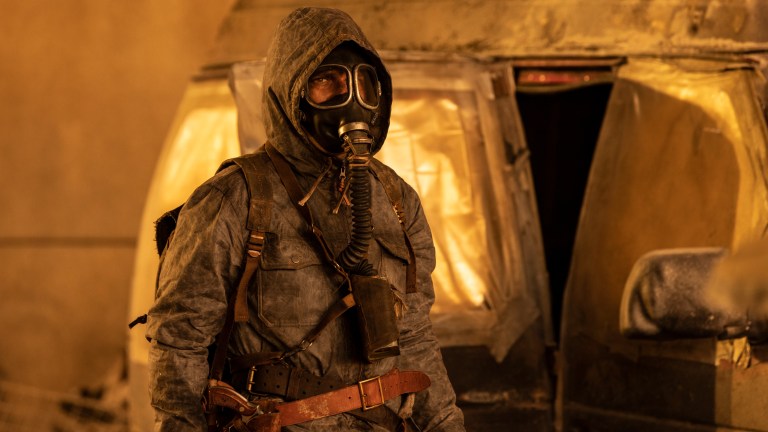Fear the Walking Dead Season 7 Episode 1 Review: The Beacon
Victor Strand is the motivational speaker from hell in Fear the Walking Dead’s Season 7 premiere.

This Fear the Walking Dead review contains spoilers.
Fear the Walking Dead Season 7 Episode 1
Welcome to a new season of Fear the Walking Dead in which we’ve left old villains behind. Gone are cult leader Teddy and his protégé Dakota, who were both vaporized by nuclear blasts in last season’s finale. Teddy’s legacy isn’t much of one—his grand plan to cleanse the world of undesirables has left behind a barren, mustard-colored landscape. If our survivors thought the zombie apocalypse marked humanity’s rock bottom, they were sorely mistaken. Sure, the undead still persist, but the missile strikes have left the living with far bigger challenges. High radiation levels, for one. (And that’s a pretty big one.) Scarcity of food is certainly another—unless you don’t mind eating possum that’s been picked over by rats. The end times (and sheer desperation) will make scavengers of us all.
As such, our introduction to this grimmer, post-Teddy world is through Will (Gus Halper), who’s been surviving alone in these harsh conditions for almost two months. But what about Morgan, June, Dwight, and our other main characters—how are they all faring in this inhospitable environment? Indeed, why should viewers care about Will?
Of course, it’s not until he crosses paths with Strand that we understand Will’s importance to the bigger story. It’s also here that the episode shifts gears.
At first blush, “The Beacon” may appear to promise hope vis-à-vis its titular searchlight, but this story is ultimately not one of optimism. Instead, this is an episode filled with some truly dark moments, thanks in no small part to Strand. If “The Beacon” is anything, it’s a compelling character study offering insights (some new, some not) into Strand’s grandiose mindset. Unfortunately, showrunners Ian Goldberg and Andrew Chambliss (who also penned the premiere) can’t make up their minds about who or what Victor Strand truly represents within the bigger Walking Dead universe. Is he a sympathetic antagonist? A deeply flawed hero? A man with true vision, or just repeatedly (and improbably) lucky? Can he really be all of the above and function as a relatable character?
After six seasons, hopefully we can all agree that Strand is not a good person. He’d like to think of himself as the hero of his own story (and in the stories of everyone within his orbit), but the truth is Strand has always been more of an antihero. Buoyed by hubris and an uncanny knack for failing upward, he’s confused success for happiness. The two are not mutually exclusive, of course. But for an insecure, petty-minded person like Strand, “success is the best revenge.” Indeed, all of his ill-gotten gains are meaningless if he can’t gloat about any of it, right? Luckily for us, Colman Domingo knows how to shed light on Strand’s lingering humanity, making him likable even when the character’s motivations suggest we should feel otherwise.
As for where Strand finds himself now, he’s carved out a good thing for himself, whereby he can literally look down on the rest of the world from the rooftop of his flourishing settlement. He’s in his element, leading a charmed life of wealth and privilege. This is no mean feat, considering how there’s so little creature comfort left to go around. Where once he was a scavenger himself, he now curates both treasures and survivors alike. If they bring added value to his community, he keeps them on.
Compared to the Ginnys or the Negans of the world, Will could have done a lot worse for himself. In Howard’s own words, what he and Strand are doing is “nothing less than laying the foundations of a new civilization. We’re making history.”
And yet, Strand is not a man at peace. You see, he’s become obsessed with finding Alicia—though not because he cares about her welfare. No, for a man who considers success to be the best revenge, he wants to show Alicia what a real winner looks like. Strand may be rebuilding the world as he sees fit, but that doesn’t mean he’s no longer petty.
But the truth is, for all his cockiness, for all his bluster, Strand is trying to prove to himself that he doesn’t need Alicia—to be successful, or to be morally upright. He’s not just chasing her, he’s chasing his demons. For all his success, for all the acolytes in his lofty tower, Strand is lonely, a man without true friendship.
As for Will, it turns out he knows exactly who Strand is, thanks to Alicia. Intel is its own kind of currency, and what Alicia knows of her longtime frenemy proves to be a wealth of knowledge. So, yes, Will has turned the tables—and now it’s he who decides whether Strand is the one worth saving. And yet they’re both outcasts in Alicia’s eyes. Though she is absent from this episode, she nevertheless casts a long shadow. Both men have failed her in their own way; both men might yet cultivate her respect. Of course, the narrow road to redemption is a long one, especially in this morally grey universe.
While Alicia herself might seem unassailable, her bunker beneath the demolished Franklin Hotel is not. And in the end, the bunker provides more questions than it does answers. What happened there after Will was banished? And what is the real meaning behind the cryptic “Padre?” (This reminded me of the doomed colonial settlement Roanoke, a thriving 1500s community that mysteriously vanished, leaving behind its own cryptic message: Croatoan.)The biggest shock of the episode isn’t that Alicia is missing—it’s Will’s death. If there was any chance for Strand’s redemption, it died along with Will. Hopefully Fear has found its newest big bad in one of its own—assuming Goldberg and Chambliss stick to their guns. Let Strand be Strand—and let Fear be the better for it.
